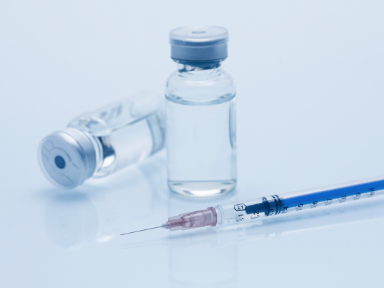prnewswireJune 07, 2021
Tag: REGEN-COV™ , SARS-CoV-2 , COVID-19
EUA supported by pivotal Phase 3 data showing 1,200 mg dose reduced risk of hospitalization or death by 70%
Only antibody therapy currently available in all 50 states, including eight states with high rates of two variants of concern
Regeneron Pharmaceuticals, Inc. (NASDAQ: REGN) today announced the U.S. Food and Drug Administration (FDA) updated the Emergency Use Authorization (EUA) for REGEN-COV™, lowering the dose to 1,200 mg (600 mg casirivimab and 600 mg imdevimab), which is half the dose originally authorized. As part of the updated EUA, REGEN-COV should be administered by intravenous (IV) infusion; subcutaneous (SC) injections are an alternative when IV infusion is not feasible and would lead to a delay in treatment.

"Despite increased use of vaccines, thousands of patients are still becoming infected in the U.S. every day, with many at high risk of serious complications from COVID-19. Unfortunately, to date only a fraction of patients eligible for antibody treatments have received them, which we hope will change based on this updated FDA authorization. REGEN-COV is readily available and supplied free of charge by the U.S. government," said George D. Yancopoulos, M.D., Ph.D., President and Chief Scientific Officer at Regeneron. "REGEN-COV has also demonstrated potency against the main variants of concern to date in vitro and is the only antibody therapy currently available across the U.S., including in states where variants first identified in Brazil and South Africa are circulating at a higher rate."
REGEN-COV is authorized for use under an EUA to treat mild-to-moderate COVID-19 in adults and pediatric patients (12 years of age and older weighing ≥40 kg) with positive results of direct SARS-CoV-2 viral testing, and who are at high risk for progression to severe COVID-19, including hospitalization or death. The Fact Sheet updates remove the previously authorized 2,400 mg IV REGEN-COV dose.
The updated FDA authorization is based on data from several trials, including a recently presented Phase 3 trial which showed REGEN-COV reduced the risk of hospitalization or death by 70% in high-risk non-hospitalized patients, and that the treatment effect was consistent between the 1,200 mg and 2,400 mg doses. The SC administration was authorized based on the totality of scientific evidence, incorporating clinical, viral load reduction and pharmacokinetic data.
In addition, in vitro research has shown that REGEN-COV retains potency against the main variants of concern circulating within the U.S., including the P.1 variant (first identified in Brazil, now classified by the World Health Organization [WHO] as Gamma) and the B.1.351 variant (first identified in South Africa, now classified by the WHO as Beta). Consequently, REGEN-COV remains available for use in all 50 states. The combined frequency of the P.1 and B.1.351 variants now exceeds 10% of new COVID-19 diagnoses across eight states (Arizona, California, Florida, Illinois, Indiana, Massachusetts, Oregon and Washington), and the prevalence of these and other variants continues to be closely monitored.
Overall, more than 9,000 people have received IV REGEN-COV in clinical trials in both hospitalized and non-hospitalized settings. In a pooled Phase 1/2/3 analysis of non-hospitalized patients, investigator-assessed infusion-related reactions (≥grade 2) were observed in 0.2% (10/4,026) of those who received REGEN-COV at the authorized dose or a higher dose. Rare anaphylactic reactions have been reported as part of the REGEN-COV clinical program. In trial participants who received study drug via SC injection, injection site reactions were observed in 12% of those treated with REGEN-COV (88/729) and 4% with placebo (10/240).
In May, the REGEN-COV Fact Sheet was updated to expand the definition of eligible patients under the EUA. Patients with certain medical conditions or other factors (for example, race or ethnicity) may be at high risk for progression to severe COVID-19 and are eligible to receive REGEN-COV if they become infected with SARS-CoV-2. Recently, the National Institutes of Health COVID-19 Treatment Guidelines Panel also strongly recommended the use of REGEN-COV in non-hospitalized COVID-19 patients ("outpatients") at high risk of clinical progression.
REGEN-COV has not been approved by FDA but has been authorized for emergency use. This use is authorized only for the duration of the declaration that circumstances exist justifying the authorization of the emergency use under section 564(b)(1) of the Act, 21 U.S.C. § 360bbb-3(b)(1), unless the authorization is terminated or revoked sooner.
Regeneron expects to submit a full Biologics License Application (BLA) for REGEN-COV in non-hospitalized outpatients with COVID-19 later this summer. In addition to outpatients, REGEN-COV is also being evaluated in prevention and certain hospitalized COVID-19 patient settings. In April 2021, Regeneron announced positive results from a Phase 3 trial evaluating REGEN-COV for the prevention of infection among household contacts of SARS-CoV-2 infected individuals. Regeneron has submitted these data to regulatory authorities to potentially expand the EUA for use in the prevention setting.
The development and manufacturing of REGEN-COV have been funded in part with federal funds from the Biomedical Advanced Research and Development Authority (BARDA), part of the U.S. Department of Health and Human Services'


Contact Us
Tel: (+86) 400 610 1188
WhatsApp/Telegram/Wechat: +86 13621645194
Follow Us:




 Pharma Sources Insight January 2025
Pharma Sources Insight January 2025


